Physical Address
304 North Cardinal St.
Dorchester Center, MA 02124
Physical Address
304 North Cardinal St.
Dorchester Center, MA 02124
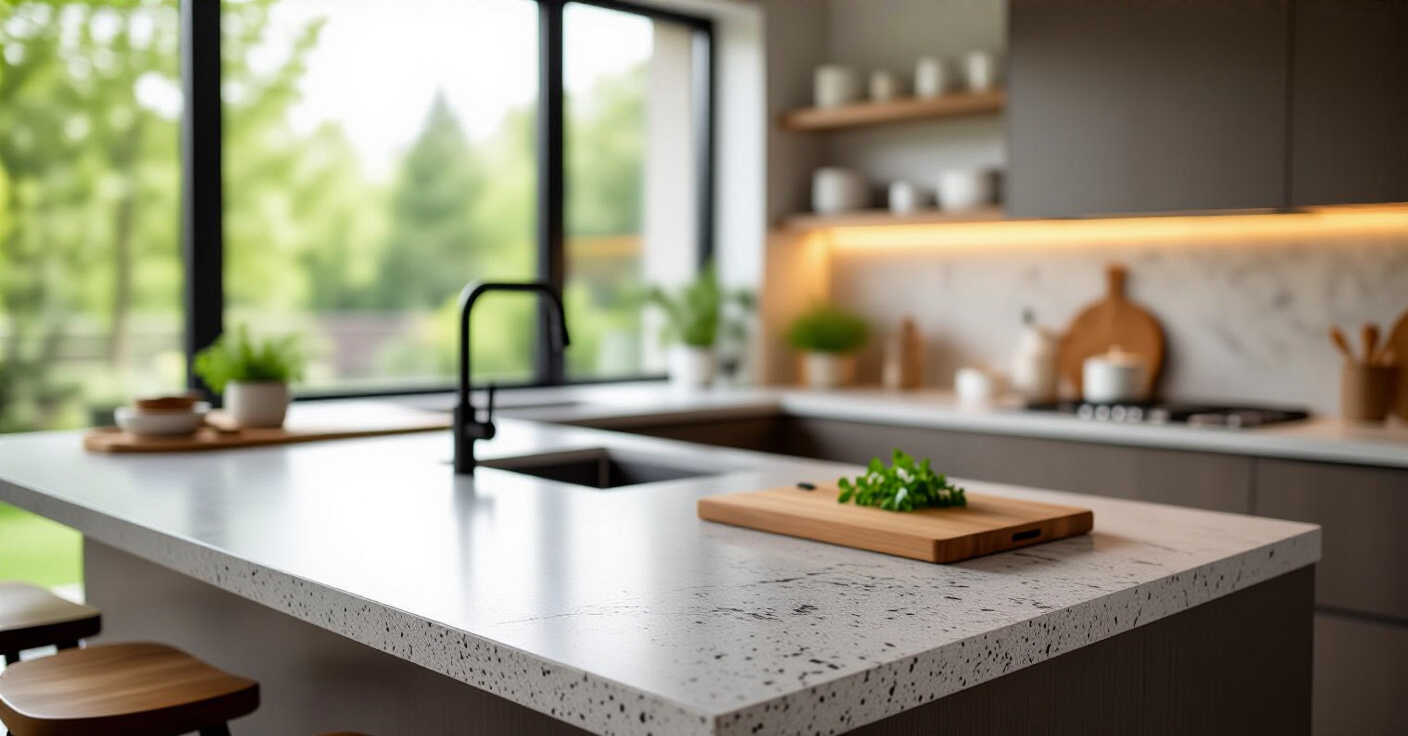
Create a serene sanctuary with these 18 mindful kitchen countertop decor ideas. Learn to declutter, style, and organize for a space that supports your well-being.
I used to think my kitchen was simple. A purely functional space for chopping vegetables and brewing tea. Then I spent a week on a silent meditation retreat, and when I returned home, I walked into my kitchen and felt an immediate wave of… static. The mail pile on the counter, the mismatched utensils in a jar, the clatter of things without a home—it was all broadcasting a quiet but constant hum of stress.
That moment of jarring clarity is a feeling we all know, even if we can’t always name it. It’s the silent sigh when you walk into a room that feels busy even when it’s empty. That moment is what separates an intentionally serene home from an accidental accumulation of stuff. Your kitchen, and especially your countertops, is the energetic heart of your home. It’s where you find nourishment, and its state directly nourishes—or drains—your spirit. Let’s not treat it like a storage locker. Let’s transform it into a sanctuary.
Before we can invite calm into a space, we must first create the space itself. This initial part of our journey isn’t about buying new things; it’s about preparing the canvas. Think of it as a walking meditation through your kitchen, where each step is an act of clearing, simplifying, and setting a pure intention for the environment you wish to cultivate. This groundwork is the most vital part—it’s where we make room for peace to enter.
Before you place a single object, pause and connect with the surface itself. What is its nature? Is it the cool, veined silence of marble, the earthy warmth of butcher block, or the speckled, grounding presence of granite? Everyone just says to “decorate,” but the real story is that your countertop’s material is the foundation of your entire kitchen’s energy. Ignoring its inherent qualities is like trying to grow a forest on a sand dune—it simply won’t feel right, and you risk causing unintended harm.
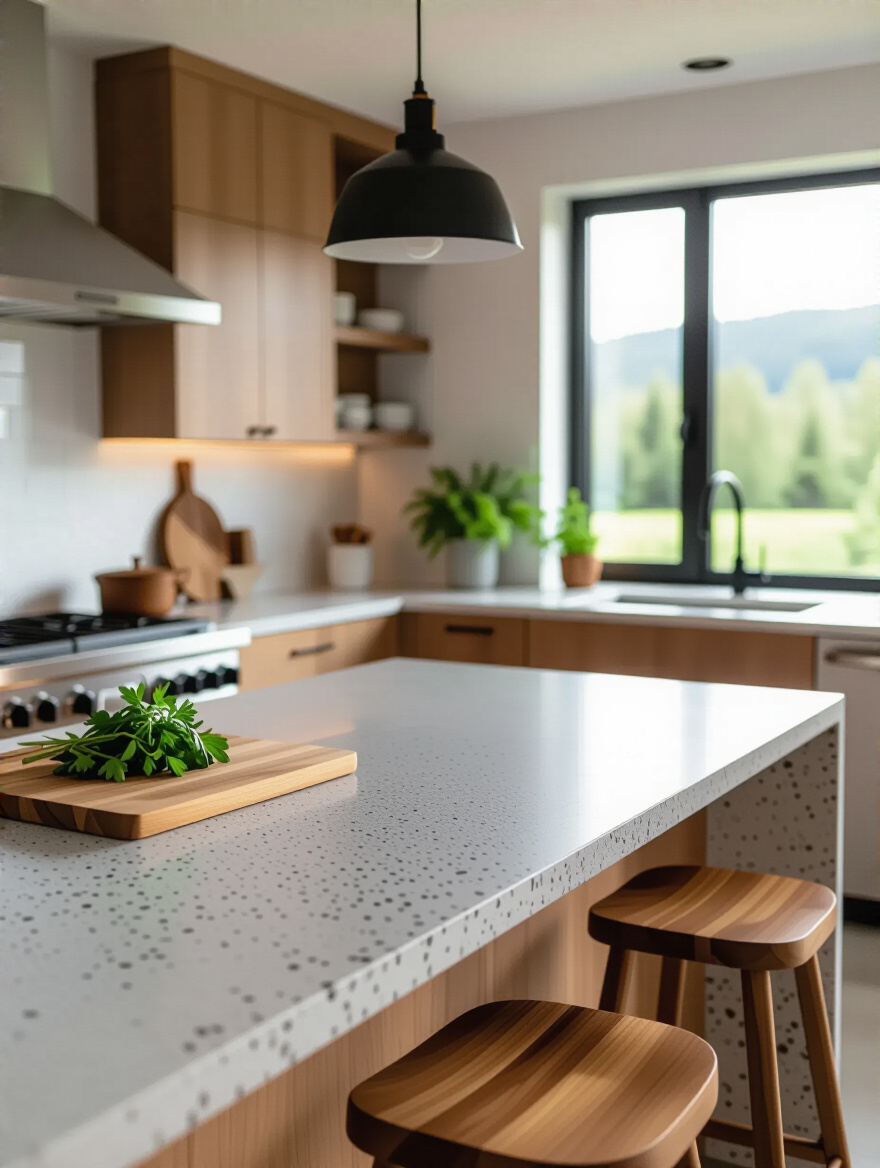
Placing a rough ceramic pot on delicate marble can leave a permanent scar. A hot pan can warp laminate in an instant. Understanding your surface isn’t a chore; it’s an act of respect for your home. By honoring the material, you ensure that whatever you add is a complement, not a conflict. This alignment is the difference between a kitchen that feels harmonious and one that feels subtly, inexplicably stressed.
Let’s be honest: countertop clutter is just a collection of postponed decisions. That pile of mail, the gadget you haven’t used in months, the stack of coupons. Each item holds a tiny bit of your attention hostage. Can we talk about why everyone gets this wrong? They call it “organizing,” but what they’re often doing is just rearranging the chaos. The only thing that actually matters is creating empty space. Negative space, as designers call it. I call it breathing room.
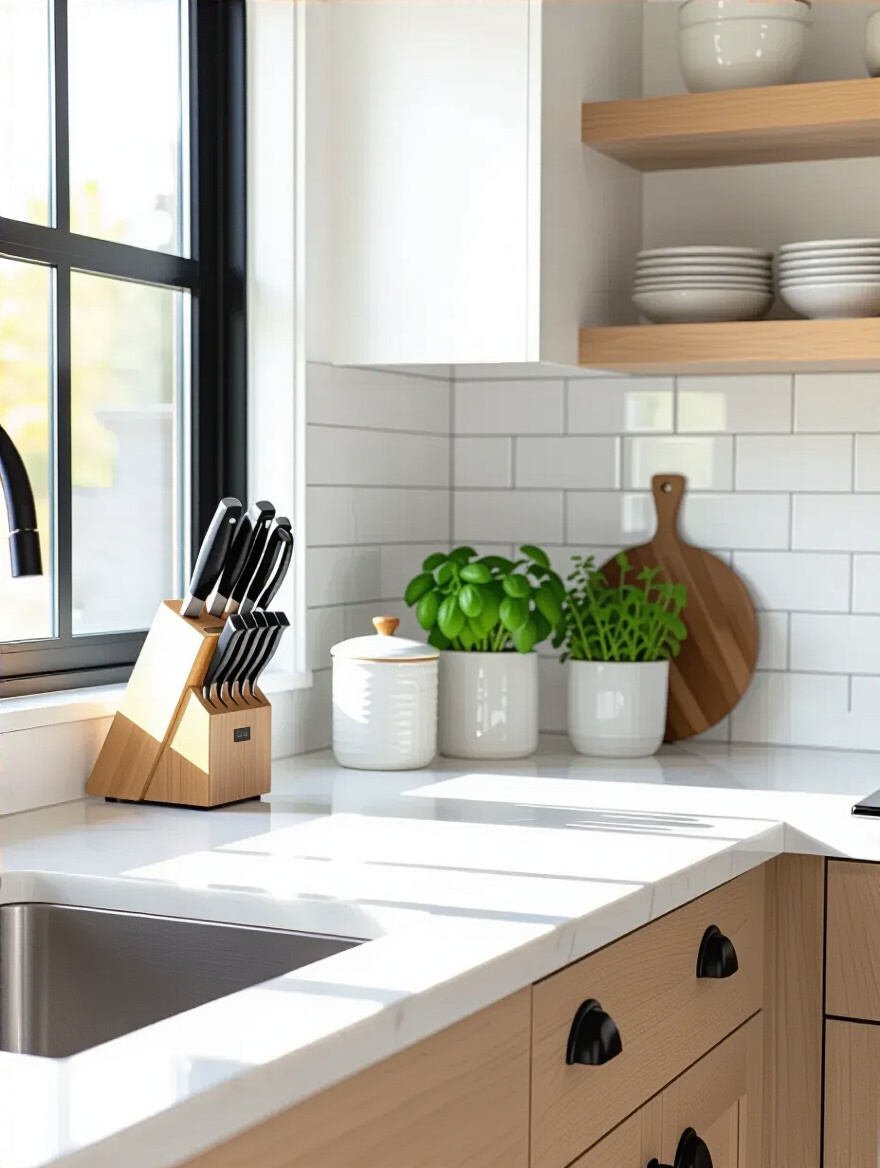
I once worked with a client, a busy executive, whose stress was palpable. We spent an afternoon on her kitchen countertops. We didn’t buy a single organizer. We simply removed everything. Then, one by one, we asked, “Does this serve my peace and my daily needs right here?” Ninety percent of it didn’t. By the end, she had clear counters and, for the first time in months, she took a full, deep breath. That clear surface is your clean canvas. It is the visual equivalent of silence, and it is non-negotiable.
You know how people always ask me how to make a space feel “put together”? This is the secret. It’s not about having expensive things; it’s about having a clear vision. Before you buy a single tray or utensil crock, decide on the feeling you want to create. Is it coastal calm with whites, blues, and natural wood? Or is it minimalist tranquility with monochrome tones and clean lines? Most people skip this and just buy what they like piece by piece, which is how you end up with a visual cacophony.
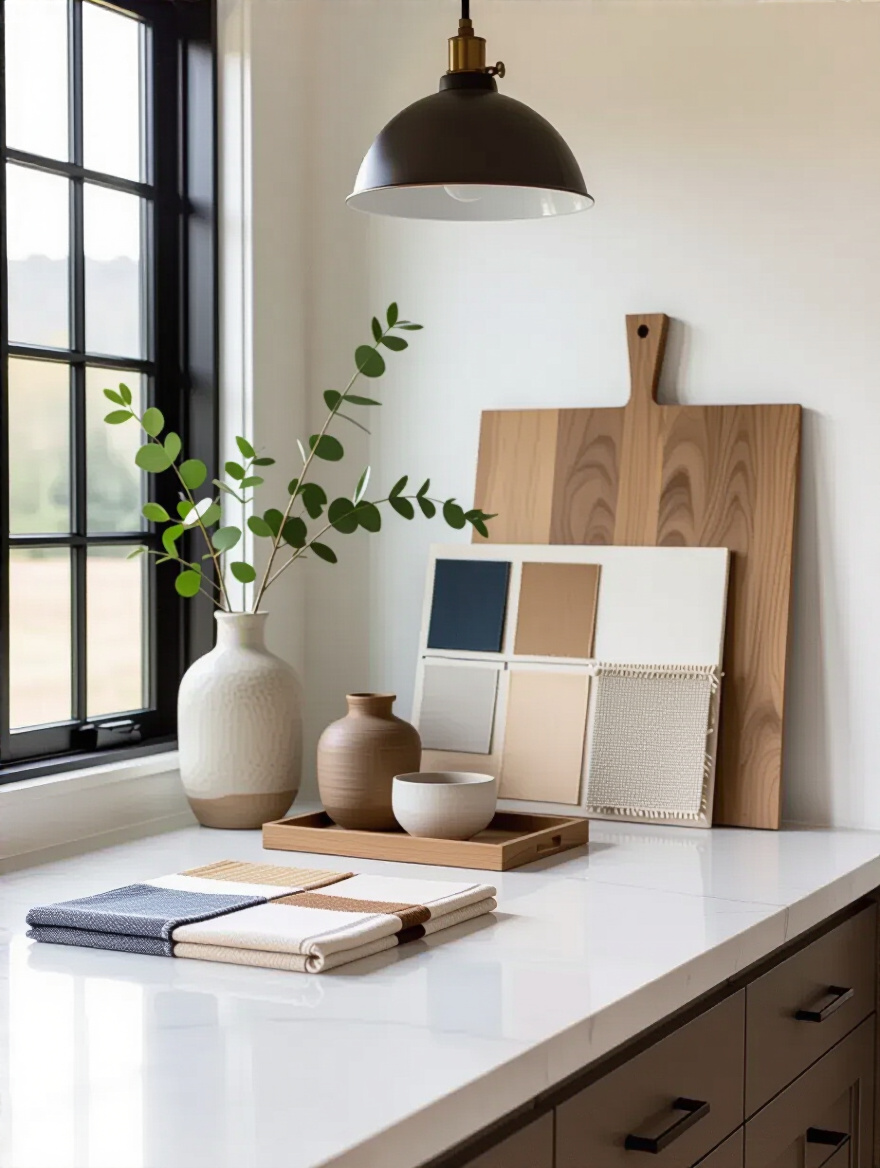
The shortcut I wish I’d known earlier is to create a small mood board. It doesn’t have to be fancy. Just gather a few images that capture the feeling you’re after. Look at the colors and textures in your fixed elements—your cabinets, your backsplash. Let them guide you. When you have this clear intention, every choice becomes simple. You’re no longer just shopping; you’re consciously curating the energy of your space.
The idea of a “work triangle” is common knowledge, but let’s take it a step further, into something more mindful. Think of your countertops not as one long surface, but as a series of small, intentional “altars” for specific activities. Your “altar of morning ritual” might be a small tray with your coffee maker, your favorite mug, and a jar of coffee beans. Your “altar of nourishment” is your clear prep space next to the sink.
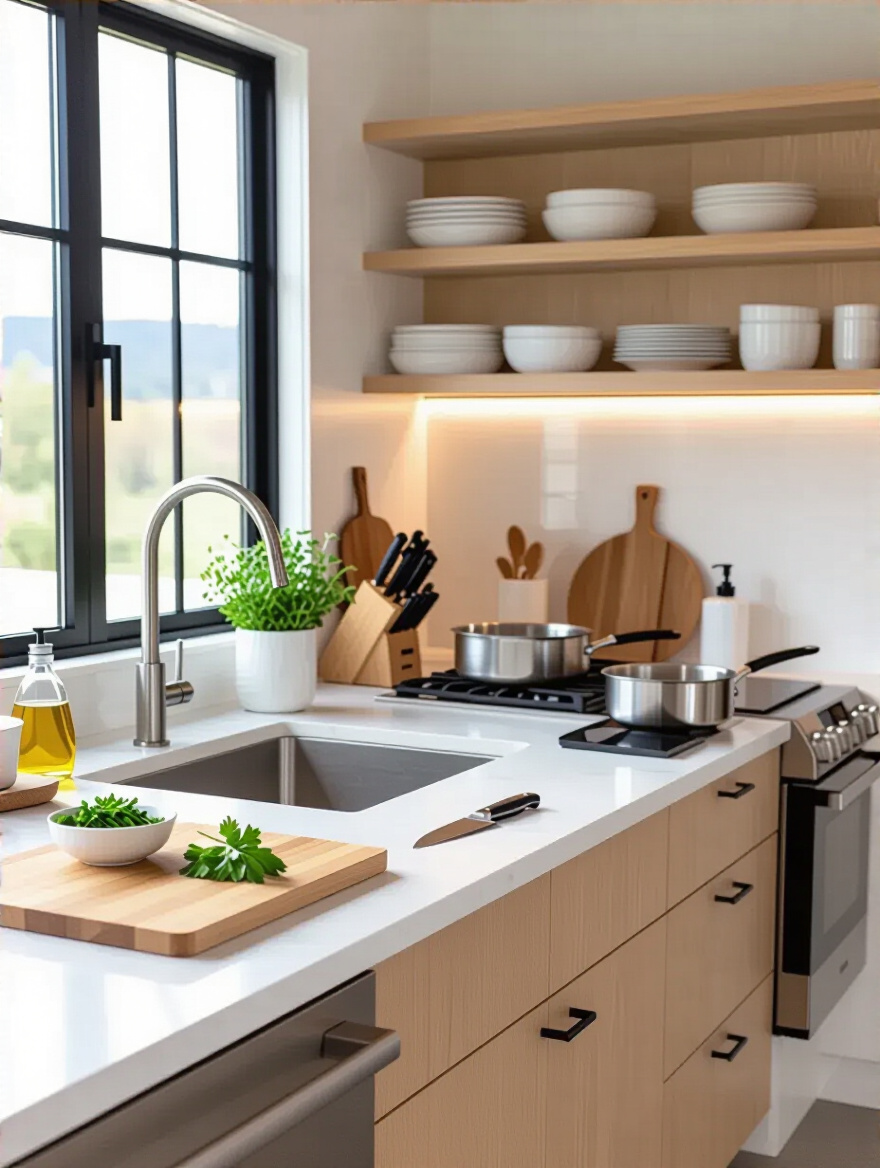
Zoning your counter this way transforms mundane tasks into mindful practices. Everything you need is right where you need it, which eliminates the frantic searching that creates so much kitchen stress. This isn’t about rigid rules; it’s about observing your own natural flow and creating a space that supports it effortlessly. By designating these zones, you bring a beautiful, sacred order to your daily rhythm.
With our canvas cleared and our intention set, we can now begin to place objects back into the space. This is a deliberate process. We are not filling the space; we are mindfully curating it. Each item we choose should serve a dual purpose: it must be functionally practical and energetically uplifting. This is where we learn that beauty and utility are not separate, but two sides of the same coin.
This is where most advice falls apart. It shows you beautiful pictures of countertops filled with decorative objects that would have to be moved every time you wanted to make a sandwich. That is not mindful living; that is creating more work for yourself. The real shortcut to an elegant kitchen is to make your functional items beautiful. Your salt cellar, your oil cruet, your wooden spoons—these are your decor.
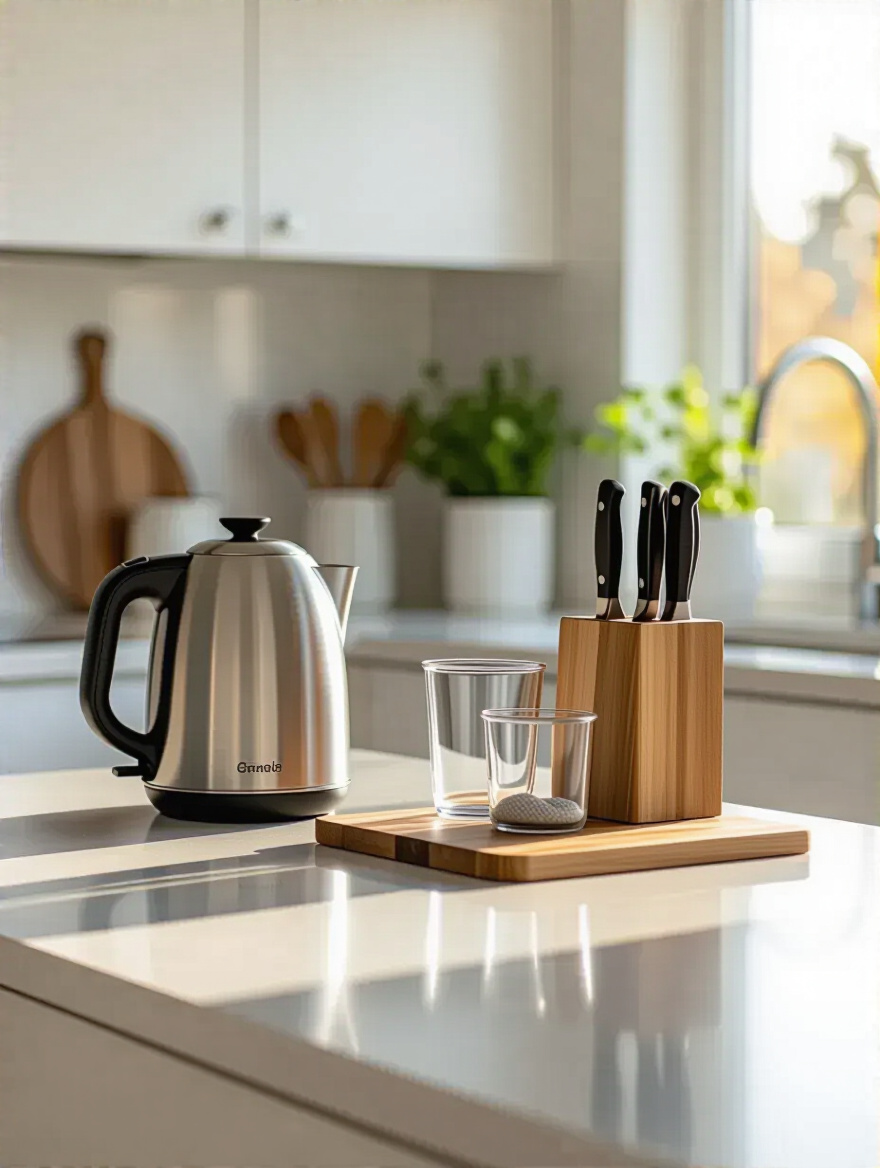
When I was first designing mindful spaces, I struggled with this. I wanted things to look beautiful, so I’d add a vase here, a sculpture there. Then I realized I was just creating obstacles. I learned the hard way that true elegance comes from a deep appreciation for the beauty of essential things. Choose a gorgeous French press over a generic coffee maker. Find a handmade ceramic utensil holder. Let your daily tools be your art, and you will never have to choose between beauty and function again.
Your small appliances sit on your counter 24/7. They have a massive visual impact, yet we often buy them based on price or features alone, ignoring how they look. Think of your toaster, your kettle, and your blender as permanent sculptures in your kitchen. Do they bring you a sense of calm and cohesion, or are they clunky plastic intrusions?
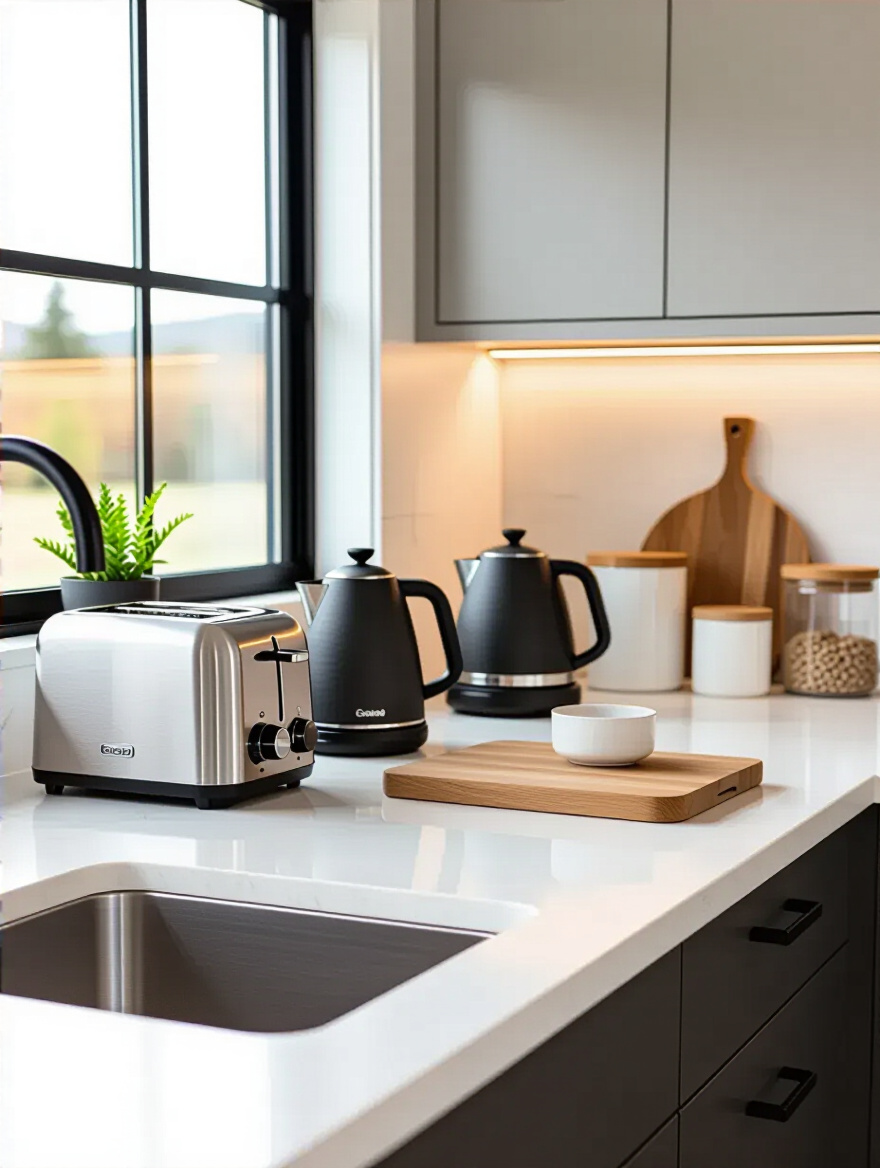
There is no need to sacrifice performance for beauty. Many brands now create appliances that are both highly functional and exquisitely designed. Choosing a toaster and kettle from the same collection, in a color that aligns with your palette, can instantly make your counter look curated and intentional. This isn’t about being materialistic; it’s about recognizing that every object in our environment contributes to our overall sense of well-being. Choose appliances that feel good to look at and to use.
Storage isn’t about hiding things; it’s about creating calm. A beautiful ceramic crock for your utensils or a set of matching glass jars for your dry goods doesn’t just organize; it harmonizes. It turns a potential mess of spoons, spatulas, and bags of flour into a serene, pleasing display.
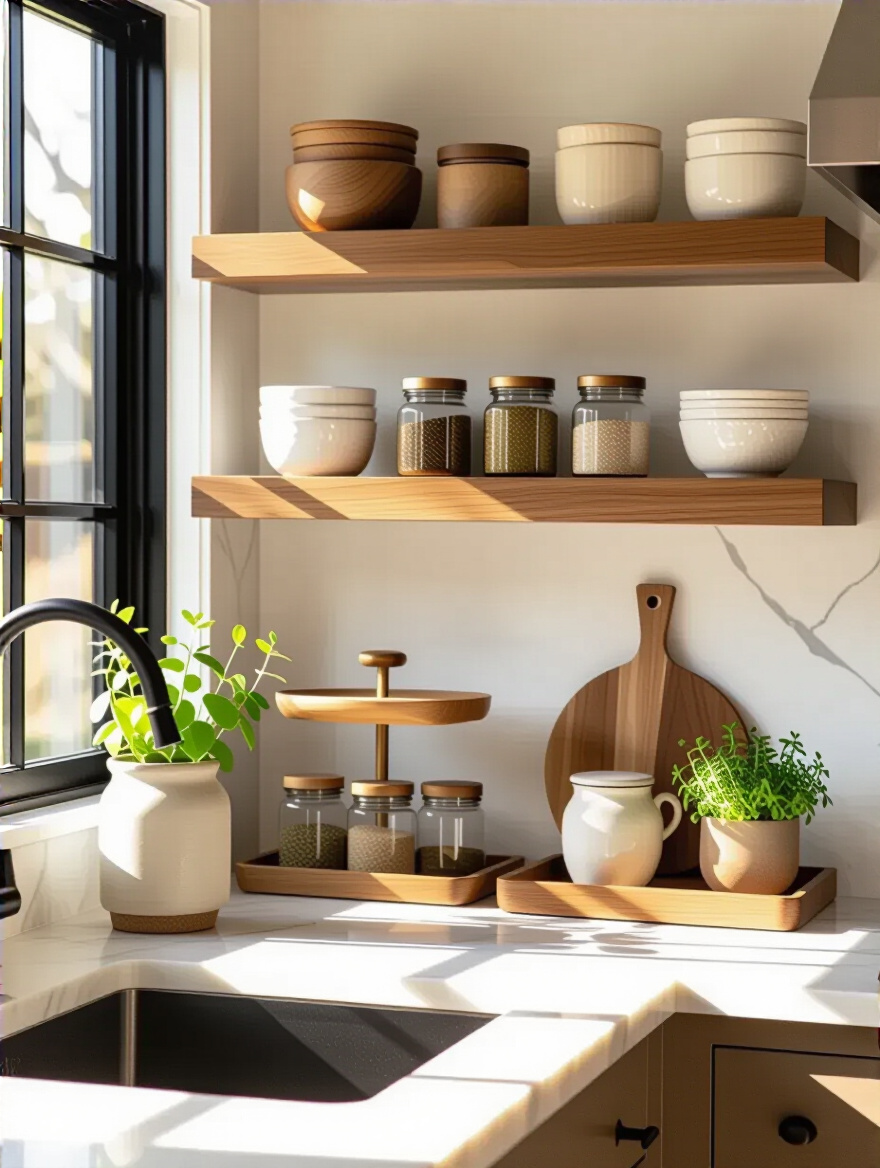
The noise everyone else makes is about cramming as much as possible into “smart” containers. But what really matters is choosing containers that feel good in your hand and look beautiful to your eye. A simple wooden tray can corral your salt, pepper, and olive oil, turning a functional necessity into a lovely little vignette. This act of containment brings a sense of order and peace that radiates through the entire kitchen.
There is nothing that shifts the energy of a room faster than bringing in living nature. A small pot of herbs on your windowsill or a resilient snake plant in a corner of your counter doesn’t just add a touch of color; it adds life force, or prana. It cleanses the air and offers a connection to the natural world, which is incredibly grounding in a busy home.
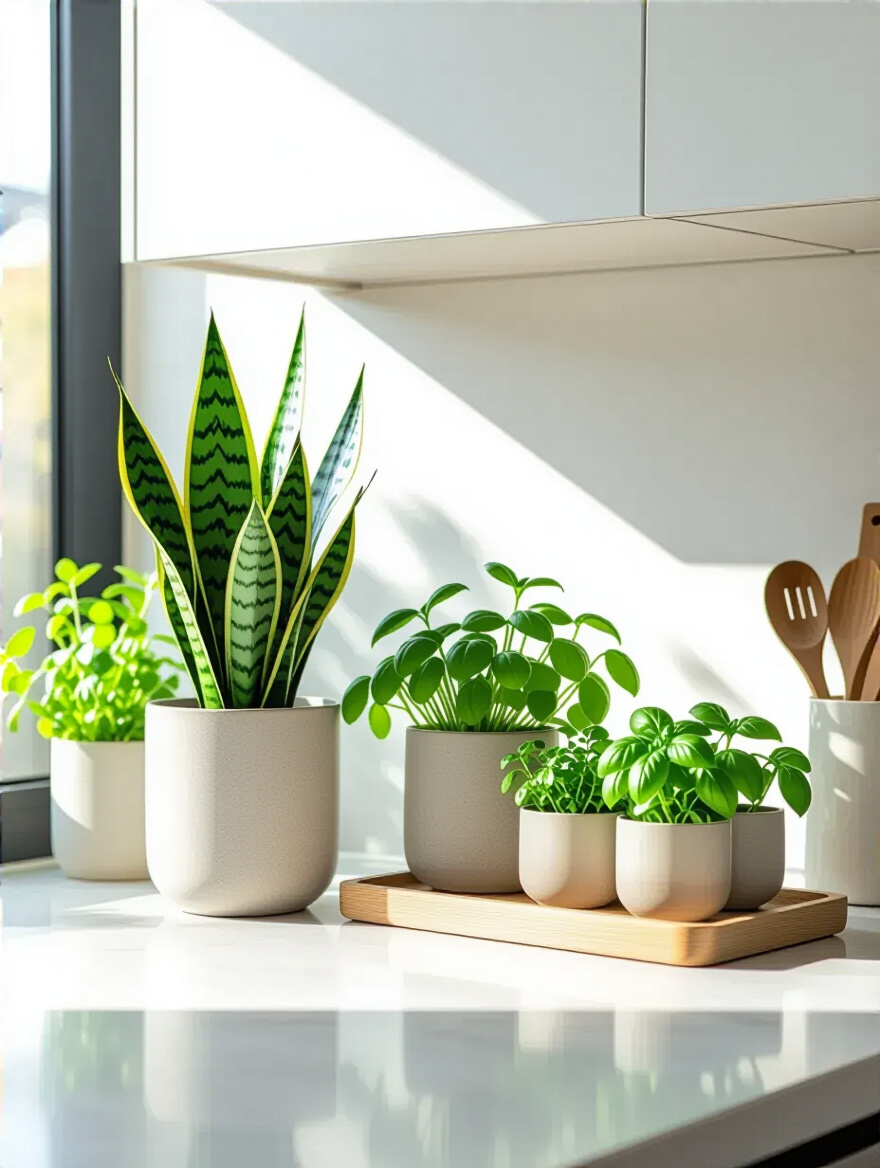
You don’t need a green thumb. I often recommend low-maintenance plants like Pothos or ZZ plants to my clients because they thrive on a bit of neglect. Or, better yet, a small pot of basil or mint. The act of snipping fresh herbs for your meal is a beautiful, multi-sensory experience that connects you directly to the source of your nourishment. It’s a small practice that makes a world of difference.
Lighting is the soul of a room, yet it’s so often overlooked in the kitchen. We settle for harsh overhead lights that cast shadows and create a sterile, clinical feel. A simple fix can completely change the atmosphere. Imagine a small, elegant lamp on a far corner of your counter, or a beautiful pendant light hanging over your island.
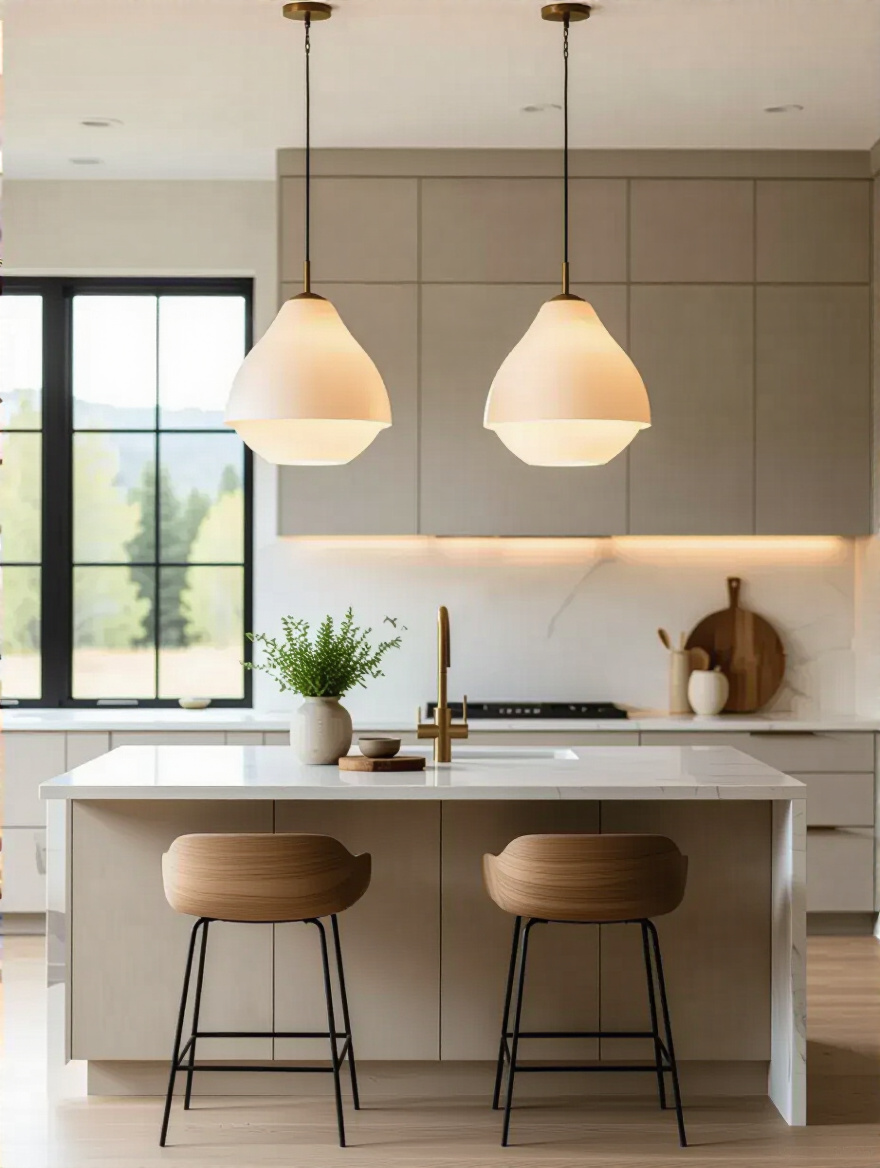
This isn’t just for decoration. Adding a source of warm, soft light invites you to slow down. It turns the kitchen from a daytime work zone into a cozy, intimate space in the evening. In my own kitchen, I have a small, dimmable lamp. Turning it on at dusk is my signal to transition from the busyness of the day to the calm of the evening. It’s a tiny ritual that completely transforms the feeling of the space.
A space without a focal point can feel scattered and aimless. One well-chosen statement piece can ground the entire kitchen, giving the eye a place to rest. This doesn’t need to be something huge or expensive. It could be a large, sculptural wooden fruit bowl, a stunning piece of pottery, or a vintage copper kettle.
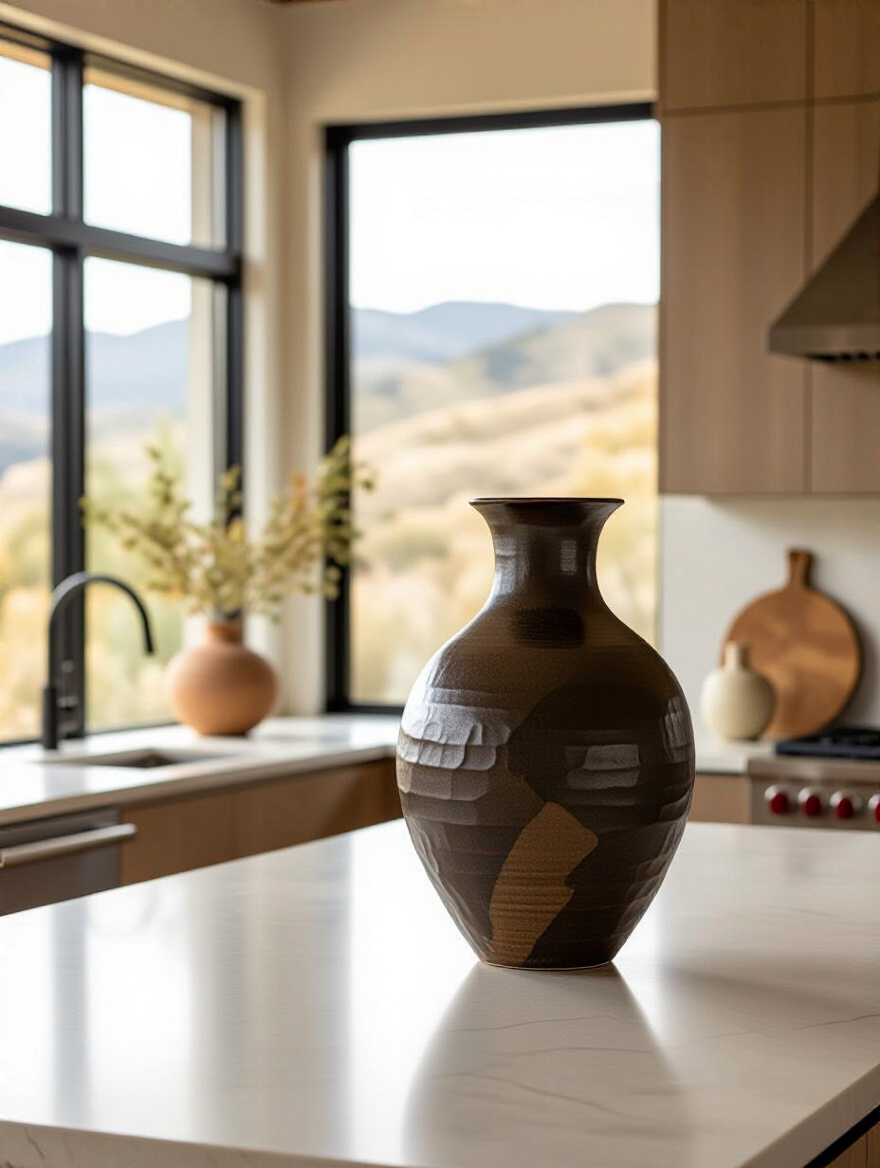
The key is to give it space to breathe. Don’t crowd it with other items. Let it stand on its own, beautiful in its simplicity. This single object tells a story and injects your personality into the room. It says, “This is not just a generic kitchen; this is my kitchen.” Find one piece that you truly love, that feels like an expression of you, and let it be the anchor for the room’s energy.
Now that we’ve mindfully chosen our items, we turn to the art of arrangement. This is like composing a piece of music. It’s not just about the individual notes, but how they relate to one another to create harmony. These techniques are simple ways to bring balance, rhythm, and flow to your countertops, turning a collection of objects into a cohesive and pleasing whole.
You’ve probably heard of the “Rule of Three.” It’s a classic for a reason. Our brains are naturally drawn to asymmetry and find groupings of odd numbers—three, five, seven—more visually engaging and balanced than even numbers. Two items can feel static, like soldiers standing at attention. Three creates a dynamic relationship.
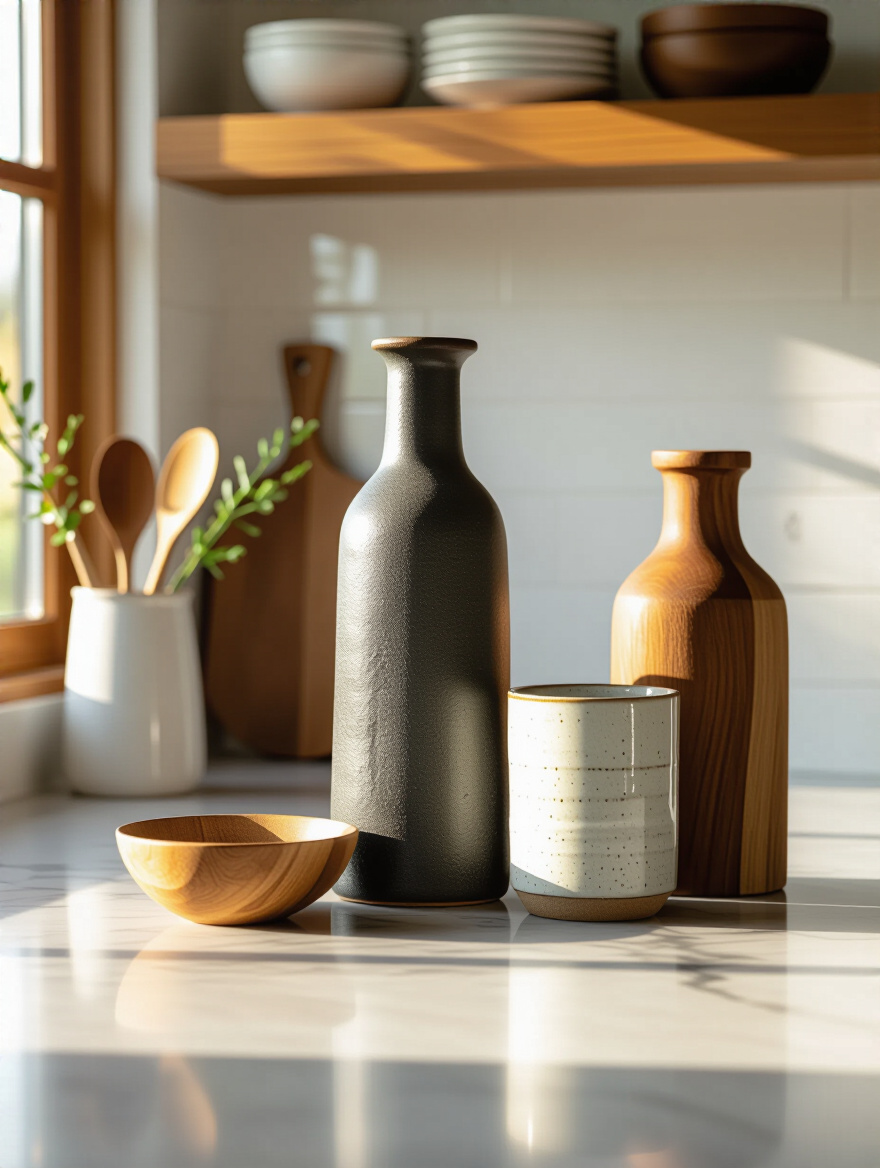
Look at your counter. Instead of lining things up, try creating a small family of objects. A tall bottle of olive oil, a medium-height utensil crock, and a short salt cellar. This simple triangular arrangement instantly looks more natural and curated. It encourages your eye to move and dance around the vignette, creating a sense of effortless style. It’s a tiny shift that makes a huge impact.
A countertop where everything is the same height is visually boring. It creates a flat, monotonous line that can feel stagnant. By varying the heights of your objects, you create a beautiful, undulating landscape for the eye. Lean a tall cutting board against the backsplash. Place a short, wide bowl of fruit next to it. Set a medium-height plant beside that.
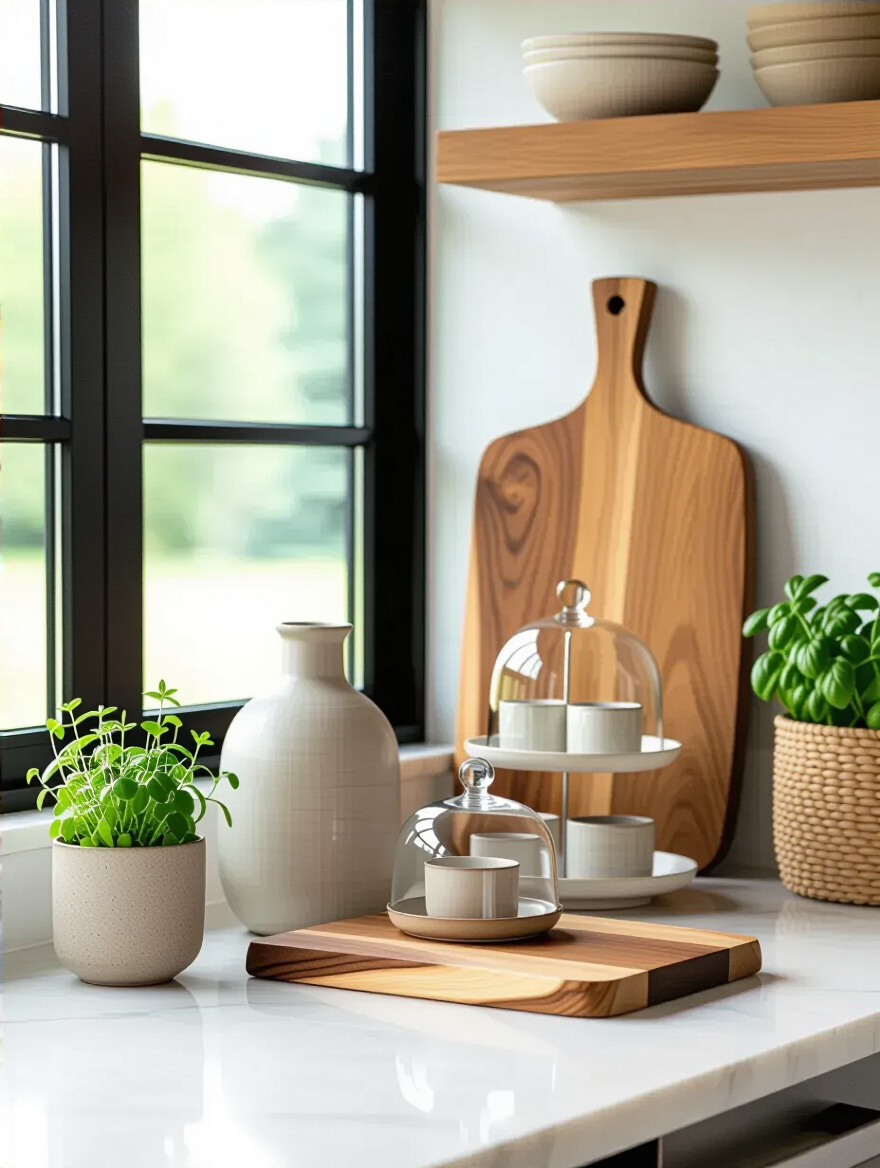
Texture is just as important. The interplay between smooth and rough, shiny and matte, adds a layer of sensory richness. Imagine a sleek marble tray holding a rough-hewn wooden bowl and a smooth ceramic mug. The contrast is what creates interest and depth. Don’t be afraid to mix materials. This tactile diversity makes a space feel layered, considered, and deeply comforting.
Trays are magic. I am convinced of it. A simple tray can take a messy jumble of unrelated items—a soap dispenser, a sponge, a bottle of lotion—and instantly turn it into an intentional, organized collection. The tray creates a visual boundary, a frame that says, “These things belong together.”
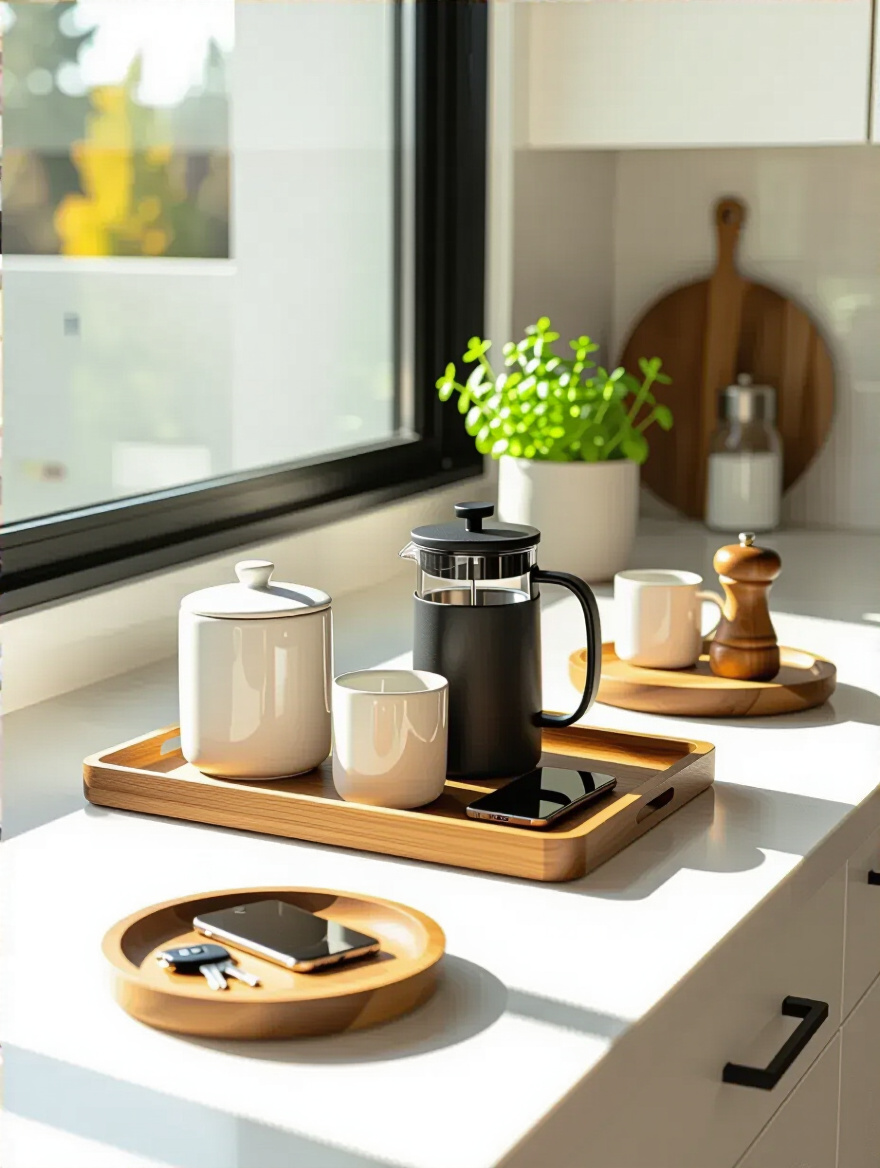
This is the ultimate shortcut for anyone who feels overwhelmed by counter clutter. Near your stove, a tray can hold your oils and spices. By the sink, it can house your cleaning supplies. Near the door, it can be a designated landing spot for keys and mail, preventing them from spreading across the kitchen. It is the gentlest, most beautiful form of discipline for your surfaces.
Why do we relegate art to the living room and hallway? The kitchen is where we spend so much of our lives; it deserves to be filled with things that feed our soul, not just our bodies. A small, beautifully framed photo that makes you smile, or a small piece of art propped up against the backsplash can infuse the space with so much warmth and personality.
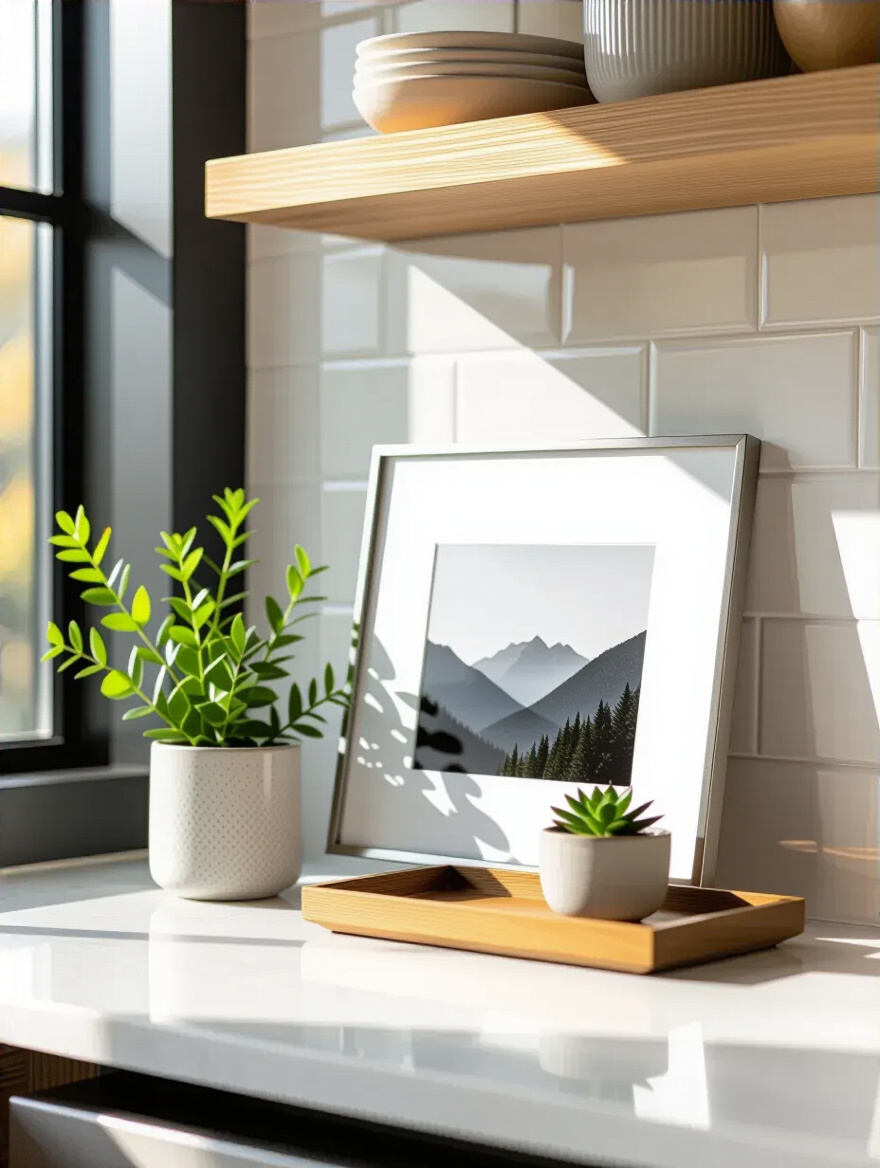
I learned this the hard way after realizing my kitchen felt sterile. I took a small landscape painting from my office and leaned it on the counter behind my fruit bowl. Suddenly, the entire space felt softer, more human. The key is to protect it. Use a sturdy frame with glass, and place it away from the sink or stove. This little touch reminds you that this space is for living, not just for labor.
Our final steps on this journey are about integration. A beautiful space that doesn’t work for your real life is not a sanctuary; it’s a museum. Here, we ensure that the calm we’ve cultivated is sustainable. We create a space that not only looks peaceful but also feels peaceful to use, day after day. It’s about maintaining the harmony between spirit and function.
Your body knows when a kitchen has good flow. It’s a feeling of ease, of moving effortlessly from the fridge to the sink to the cutting board without awkward turns or blocked paths. Bad flow creates physical tension. Think about your most common tasks—making coffee, chopping vegetables, washing dishes—and map out your movements.
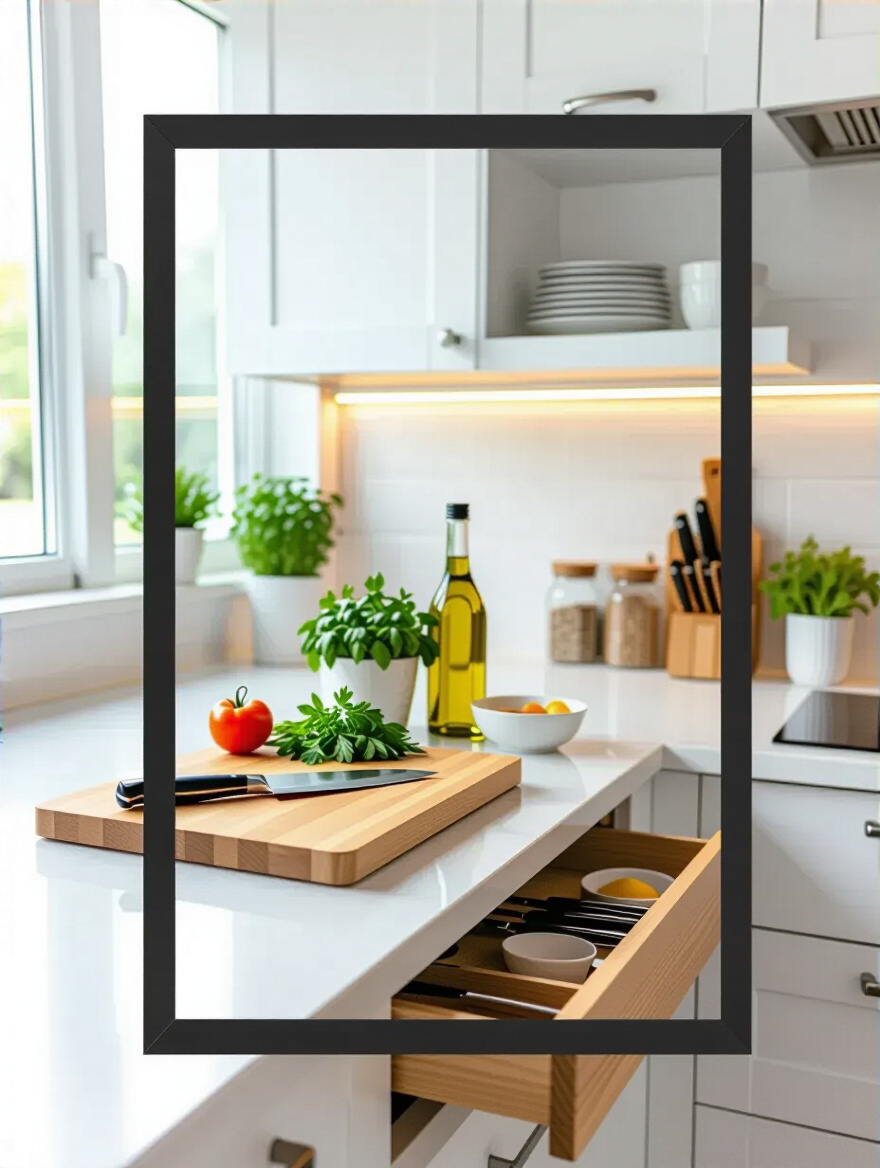
Do you have to walk across the kitchen to throw away vegetable scraps? Move the compost bin next to your prep area. Are your most-used spices in a cabinet far from the stove? Move them to a small rack right beside it. By making these small, intuitive adjustments, you remove points of friction. You create a dance instead of a struggle. This is mindfulness in motion.
The best storage solutions aren’t just about hiding clutter; they’re about making your life easier. Think vertically. A magnetic knife strip on the wall frees up an entire block’s worth of counter space and keeps your tools right in sight. A slim, tiered shelf can hold your most-used spices and oils without taking up a huge footprint.
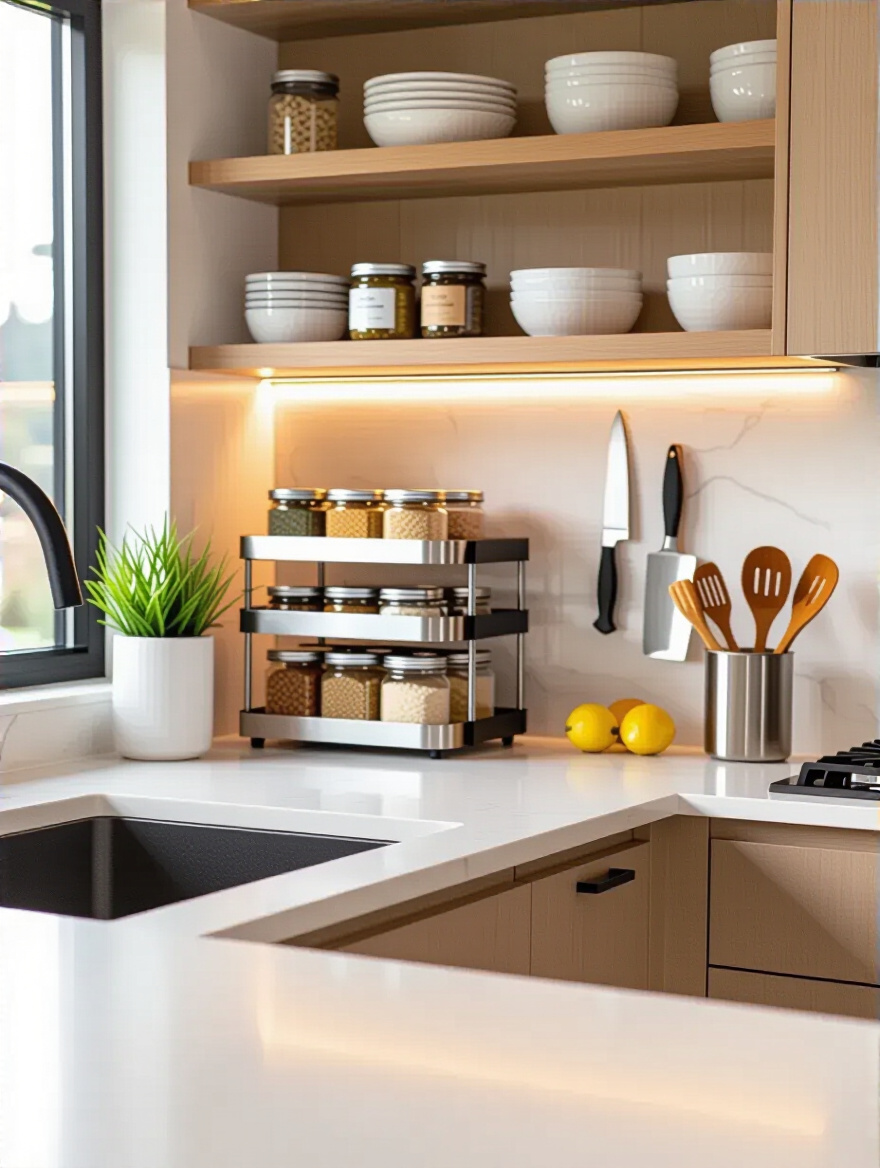
Everyone says to “get organized,” but the real point is to create systems that support your peace. Use drawer dividers to turn a messy junk drawer into a calm, ordered space. Use clear containers in your pantry so you can see what you have at a glance. When your storage is smart, your mind doesn’t have to work as hard, which frees up so much mental energy.
This may sound purely practical, but it’s an act of mindfulness. Your countertops are a significant part of your home, and caring for them is a way of showing gratitude and respect for your environment. Leaving beautiful, stylish trivets near the stove isn’t just a precaution; it’s an invitation to yourself and others to pause and be mindful before placing a hot pot down.
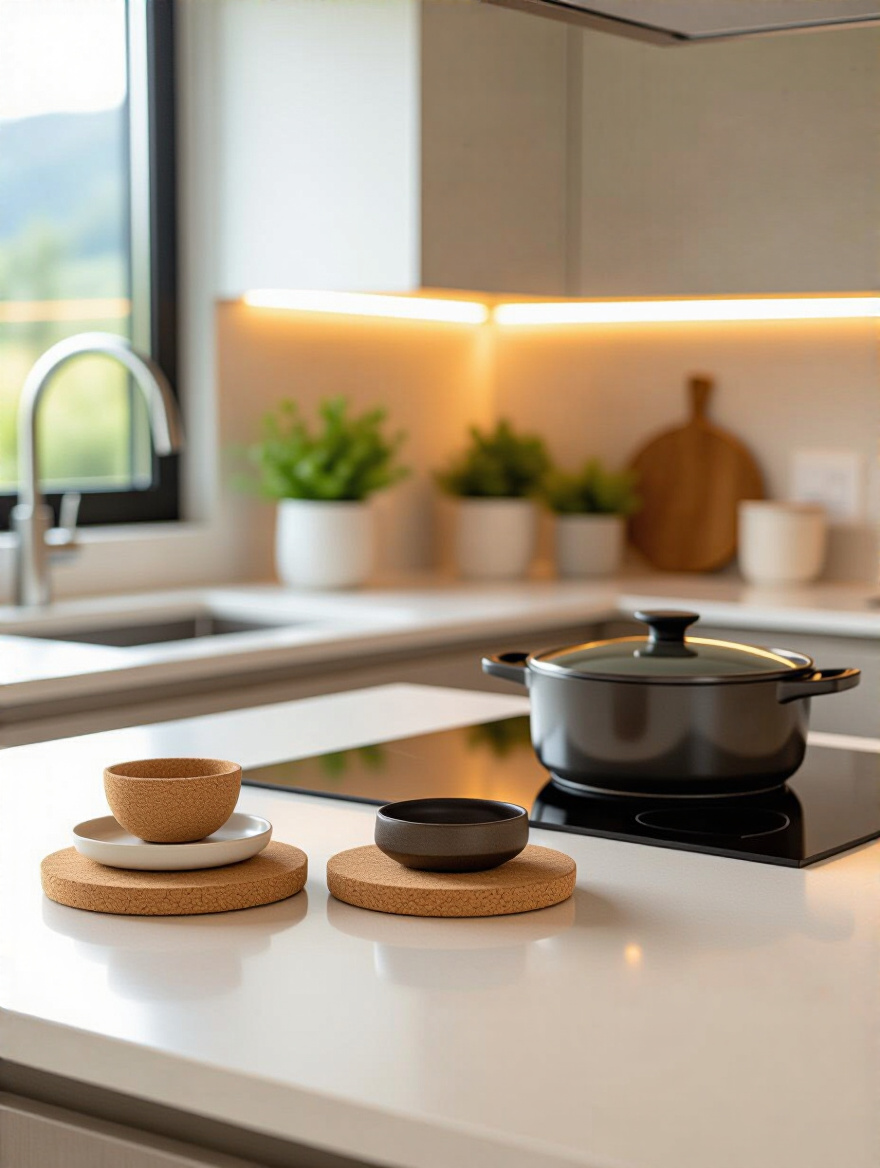
Forget those flimsy cork circles. There are gorgeous options in wood, marble, cast iron, and silicone that can act as decorative objects in their own right. A beautiful trivet says, “This is a space of care.” It’s a small detail, but these small details are what accumulate to create a truly mindful and well-tended home.
A serene space is not a static one. Just as our inner lives evolve, so should our outer environment. What felt calming and perfect six months ago might feel stagnant today. Don’t be afraid to edit. A great shortcut is to “shop your own home.” Maybe that little vase in your bedroom would be perfect for a few fresh cuttings by the kitchen sink.
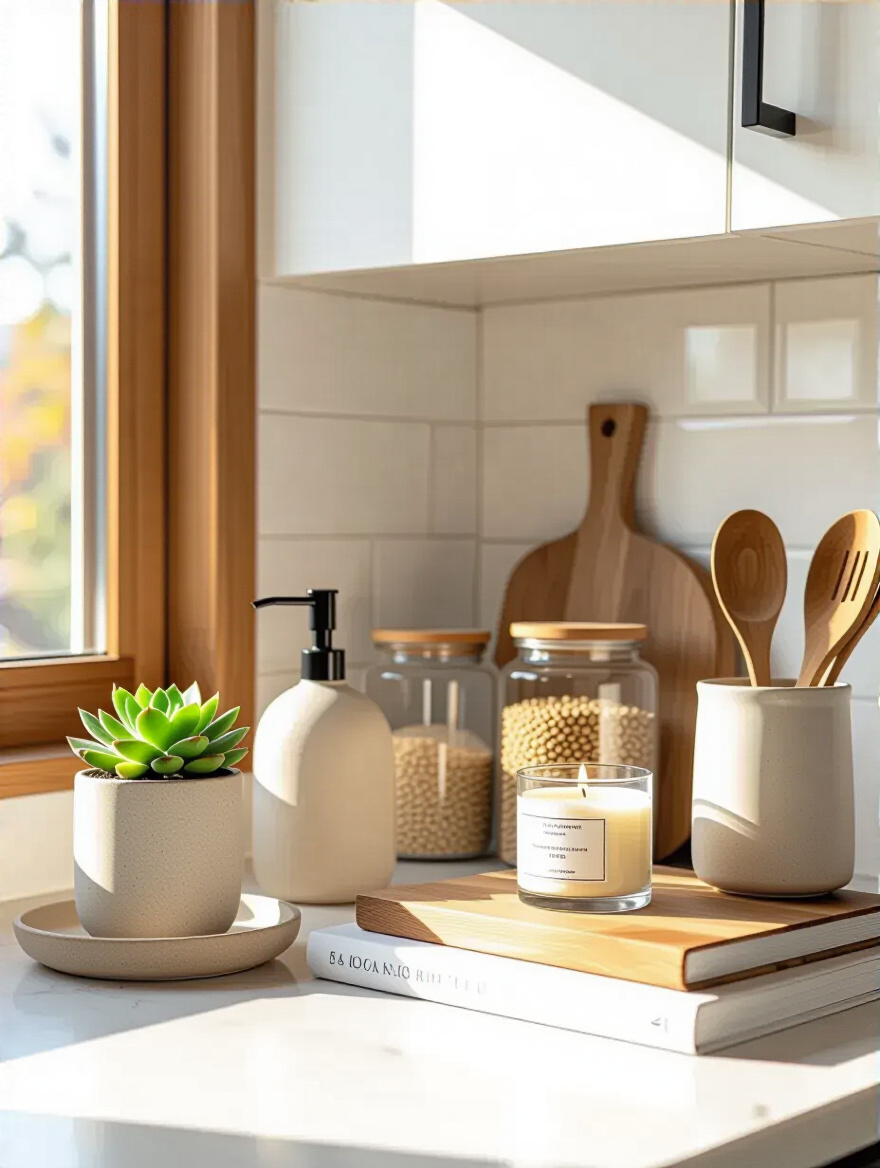
Set a gentle reminder for yourself each season to do a quick refresh. Put everything away, give the counters a deep clean, and then bring items back one by one, asking if they still serve the space. This simple ritual keeps your kitchen feeling alive, fresh, and in perfect alignment with who you are right now. It ensures your sanctuary remains a true reflection of you.
Transforming your kitchen countertop is not just another interior design project. It is a profound practice of mindfulness. You have now walked through a complete journey, from clearing the space to curating it with intention, harmonizing its elements, and ensuring it functions with a beautiful, seamless flow. Each step is an opportunity to connect more deeply with your home and, by extension, with yourself.
You don’t need to do it all at once. Begin with one small step. Perhaps it’s just clearing off a single corner of your counter to create a small pocket of breathing room. Notice how that feels. Let that feeling of peace guide your next step. By bringing this gentle awareness to the heart of your home, you will create a space that truly nourishes you on every level—a sanctuary for both body and spirit.